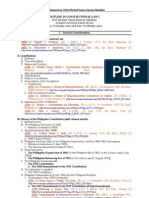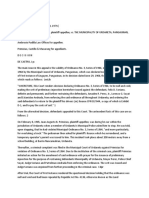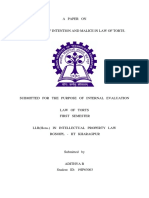Tañada vs. Tuvera, 136 SCRA 27 (1985)
Tañada vs. Tuvera, 136 SCRA 27 (1985)
Uploaded by
kitakatttCopyright:
Available Formats
Tañada vs. Tuvera, 136 SCRA 27 (1985)
Tañada vs. Tuvera, 136 SCRA 27 (1985)
Uploaded by
kitakatttOriginal Description:
Copyright
Available Formats
Share this document
Did you find this document useful?
Is this content inappropriate?
Copyright:
Available Formats
Tañada vs. Tuvera, 136 SCRA 27 (1985)
Tañada vs. Tuvera, 136 SCRA 27 (1985)
Uploaded by
kitakatttCopyright:
Available Formats
TAADA VS.
TUVERA
136 SCRA 27 (April 24, 1985)
FACTS:
Invoking the right of the people to be informed on matters of public concern as well as the principle
that laws to be valid and enforceable must be published in the Official Gazette, petitioners filed
for writ of mandamus to compel respondent public officials to publish and/or cause to publish
various presidential decrees, letters of instructions, general orders, proclamations, executive
orders, letters of implementations and administrative orders.
The Solicitor General, representing the respondents, moved for the dismissal of the case,
contending that petitioners have no legal personality to bring the instant petition.
ISSUE:
Whether or not publication in the Official Gazette is required before any law or statute becomes
valid and enforceable.
HELD:
Art. 2 of the Civil Code does not preclude the requirement of publication in the Official Gazette,
even if the law itself provides for the date of its effectivity. The clear object of this provision is to
give the general public adequate notice of the various laws which are to regulate their actions and
conduct as citizens. Without such notice and publication, there would be no basis for the
application of the maxim ignoratia legis nominem excusat. It would be the height of injustive to
punish or otherwise burden a citizen for the transgression of a law which he had no notice
whatsoever, not even a constructive one.
The very first clause of Section 1 of CA 638 reads: there shall be published in the Official
Gazette. The word shall therein imposes upon respondent officials an imperative duty. That
duty must be enforced if the constitutional right of the people to be informed on matter of public
concern is to be given substance and validity.
The publication of presidential issuances of public nature or of general applicability is a
requirement of due process. It is a rule of law that before a person may be bound by law, he must
first be officially and specifically informed of its contents. The Court declared that presidential
issuances of general application which have not been published have no force and effect.
TITLE: Tanada v Tuvera
CITATION: L-63915, April 24, 1985| 136 SCRA 27
FACTS:
Petitioners seek a writ of mandamus in compelling respondent public officials to publish and/ or
cause the publication in the Official Gazette of various presidential decrees, letter of instructions,
general orders, proclamations, executive orders, letter of implementation and administrative
orders.
The general rule in seeking writ of mandamus is that it would be granted to a private individual
only in those cases where he has some private or particular interest to be subserved, or some
particular right to be protected, independent of that which he holds with the public at large," and
"it is for the public officers exclusively to apply for the writ when public rights are to be subserved.
The legal capacity of a private citizen was recognized by court to make the said petition for the
reason that the right sought to be enforced by petitioners herein is a public right recognized by no
less than the fundamental law of the land.
ISSUE: Whether publication in the Official Gazette is still required considering the clause in Article
2 unless otherwise provided.
HELD:
Unless it is otherwise provided refers to the date of effectivity and not with the publication
requirement which cannot be omitted as public needs to be notified for the law to become
effective. The necessity for the publication in the Official Gazette of all unpublished presidential
issuances which are of general application, was affirmed by the court on April 24, 1985. This is
necessary to provide the general public adequate notice of the various laws which regulate
actions and conduct as citizens. Without this, there would be no basis for Art 3 of the Civil Code
Ignorance of the law excuses no one from compliance therewith.
WHEREFORE, the Court hereby orders respondents to publish in the Official Gazette all
unpublished presidential issuances which are of general application, and unless so published,
they shall have no binding force and effect.
You might also like
- Constitutional Law IDocument3 pagesConstitutional Law IBerne GuerreroNo ratings yet
- CONSTITUTIONAL LAW I State and Its Elements NotesDocument3 pagesCONSTITUTIONAL LAW I State and Its Elements NotesEm DraperNo ratings yet
- Principles of Corporate Governance-TableDocument2 pagesPrinciples of Corporate Governance-TablekierselennNo ratings yet
- Oblicon TolentinoDocument73 pagesOblicon Tolentinotheresebernadette100% (3)
- Consti 1 Session 4 Case DigestsDocument8 pagesConsti 1 Session 4 Case DigestsAlan Jay CariñoNo ratings yet
- Statcon Cases DigestDocument19 pagesStatcon Cases DigestJohnna UyNo ratings yet
- Canon 4 CasesDocument27 pagesCanon 4 Casescristine jagodillaNo ratings yet
- Lacson vs. PerezDocument2 pagesLacson vs. PerezNigel Garcia100% (1)
- Minucher Vs ScalzoDocument8 pagesMinucher Vs Scalzoyanyan yuNo ratings yet
- Tolentino v. CA, 106 SCRA 513 (1981)Document13 pagesTolentino v. CA, 106 SCRA 513 (1981)Karez MartinNo ratings yet
- Ministerio Vs City of CebuDocument10 pagesMinisterio Vs City of CebuJustin HarrisNo ratings yet
- Estrada Vs Arroyo-DigestDocument3 pagesEstrada Vs Arroyo-DigestJiHahn Pierce50% (2)
- Consti Chapter3 Case DigestDocument16 pagesConsti Chapter3 Case DigestAbdel-Azis ReyNo ratings yet
- Case Digest: AIR TRANSPORTATION OFFICE Vs Sps. RAMOSDocument2 pagesCase Digest: AIR TRANSPORTATION OFFICE Vs Sps. RAMOSSamantha Nicole de Dios100% (1)
- G.R. No. L-9726 US V.S. TaylorDocument5 pagesG.R. No. L-9726 US V.S. TaylorNaezel BaronNo ratings yet
- MIRASOL VS Court of AppealsDocument3 pagesMIRASOL VS Court of AppealsRo CheNo ratings yet
- Assignment-Statcon1 PerezDocument475 pagesAssignment-Statcon1 PerezMIKKONo ratings yet
- KMU TRO Petition Vs SSS Premium HikeDocument25 pagesKMU TRO Petition Vs SSS Premium HikeKilusang Mayo UnoNo ratings yet
- 43 de Llana vs. AlbaDocument2 pages43 de Llana vs. AlbaDemi PigNo ratings yet
- Estrada Vs DesiertoDocument2 pagesEstrada Vs DesiertoGelo Senarlo100% (1)
- (Consti Digest) Separation of Power and Delegation of Power Digest CasesDocument29 pages(Consti Digest) Separation of Power and Delegation of Power Digest CasesI'm a Smart CatNo ratings yet
- StatCon Case DigestsDocument6 pagesStatCon Case DigestsMarkNo ratings yet
- Case Digests (SuabilityDocument23 pagesCase Digests (SuabilityAngelineNo ratings yet
- PBM EMPLOYEES V PBMDocument2 pagesPBM EMPLOYEES V PBMLloyd David P. VicedoNo ratings yet
- Abas Vs AbbasDocument9 pagesAbas Vs AbbasMar JoeNo ratings yet
- Department of Agriculture Vs NLRCDocument3 pagesDepartment of Agriculture Vs NLRCrodel_odzNo ratings yet
- Philosophy of Law NotesDocument7 pagesPhilosophy of Law NotesJS Sarmiento Jr.No ratings yet
- Consti Cases Territory National Economy and PatrimonyDocument129 pagesConsti Cases Territory National Economy and PatrimonyJean Ben Go SingsonNo ratings yet
- G.R. No. 171396, May 3 2006 (Legislative Department - Power To Declare War and Delegate Emergency Power) FactsDocument83 pagesG.R. No. 171396, May 3 2006 (Legislative Department - Power To Declare War and Delegate Emergency Power) FactsKlein Carlo100% (1)
- Government of The Philippine Islands v. Monte de PiedadDocument1 pageGovernment of The Philippine Islands v. Monte de PiedadTeresa Cardinoza100% (2)
- 01 The Relevance of Philosophy To LawDocument30 pages01 The Relevance of Philosophy To LawOrland Jerico CorderoNo ratings yet
- Macariola Vs Asuncion (1982) DigestDocument2 pagesMacariola Vs Asuncion (1982) DigestMarion Lawrence Lara100% (2)
- Chapter 12 - Judicial DepartmentDocument18 pagesChapter 12 - Judicial Departmentrizumu00No ratings yet
- A.C. No. 3808 Magdaluyo vs. NaceDocument3 pagesA.C. No. 3808 Magdaluyo vs. NaceKim CorpuzNo ratings yet
- Case Digest Legaspi Vs - Sec of FinanceDocument2 pagesCase Digest Legaspi Vs - Sec of FinanceVivian BNNo ratings yet
- Consti 1 DigestDocument3 pagesConsti 1 DigestHarlene Kaye Dayag TaguinodNo ratings yet
- Memory Aid in Criminal LawDocument67 pagesMemory Aid in Criminal LawBelle100% (5)
- Part II - Basic Concepts2 PDFDocument11 pagesPart II - Basic Concepts2 PDFJermaine SemañaNo ratings yet
- Constitutional Law 1 NotesDocument12 pagesConstitutional Law 1 NotesJohn SolivenNo ratings yet
- Consti CasesDocument25 pagesConsti CasesAGLD100% (3)
- Abellana Vs Marave DigestDocument2 pagesAbellana Vs Marave Digestmudblood_princess33% (3)
- Crim Pro Case ListDocument3 pagesCrim Pro Case ListRAY RAMIREZNo ratings yet
- Case DigestDocument3 pagesCase DigestJenniferPizarrasCadiz-CarullaNo ratings yet
- Primicias Vs UrdanetaDocument7 pagesPrimicias Vs UrdanetaRonz RoganNo ratings yet
- Loida Shauf v. Court of AppealsDocument4 pagesLoida Shauf v. Court of AppealsVanity Gail TrivilegioNo ratings yet
- Regulation of Medical Education (B) The Examination For Registration of Physicians and (C) TheDocument5 pagesRegulation of Medical Education (B) The Examination For Registration of Physicians and (C) TheJomar TenezaNo ratings yet
- 4MAGNO Vs VELASCO-JACOBADocument2 pages4MAGNO Vs VELASCO-JACOBAfermo ii ramosNo ratings yet
- Hacienda Luisita vs. PARC PDFDocument40 pagesHacienda Luisita vs. PARC PDFJose Emmanuel DolorNo ratings yet
- CONSTI1 Midterms NotesDocument21 pagesCONSTI1 Midterms Notescatubay_sjNo ratings yet
- Legal Philosophy NotesDocument10 pagesLegal Philosophy NotesDiannee RomanoNo ratings yet
- Calderon vs. Carale, G.R. No. 91636, April 23, 1992Document14 pagesCalderon vs. Carale, G.R. No. 91636, April 23, 1992Reginald Dwight FloridoNo ratings yet
- 01-15-Consti Case DigestDocument16 pages01-15-Consti Case DigestDawn JessaNo ratings yet
- PEOPLE OF THE PHILIPPINES Vs ManatnanDocument3 pagesPEOPLE OF THE PHILIPPINES Vs ManatnanRellejohn BestudioNo ratings yet
- Angara Vs Electoral CommissionDocument2 pagesAngara Vs Electoral CommissionBeboyNo ratings yet
- In Re Laureta and Maravilla 148 SCRA 382 (1987)Document23 pagesIn Re Laureta and Maravilla 148 SCRA 382 (1987)Chedeng Kuma100% (1)
- Book 1Document2 pagesBook 1Wena Mae CristobalNo ratings yet
- Justice Puno Separate Opinion (For Printing)Document17 pagesJustice Puno Separate Opinion (For Printing)Hyuga NejiNo ratings yet
- Case DigestDocument4 pagesCase DigestSarabeth Silver MacapagaoNo ratings yet
- Chapter 5 Functional PerspectiveDocument57 pagesChapter 5 Functional PerspectiveMohammad Amr PangandamanNo ratings yet
- Javellana Vs Executive SecretaryDocument3 pagesJavellana Vs Executive SecretaryCamille Britanico100% (1)
- Tilted Justice: First Came the Flood, Then Came the Lawyers.From EverandTilted Justice: First Came the Flood, Then Came the Lawyers.Rating: 5 out of 5 stars5/5 (1)
- Tanada Vs TuveraDocument2 pagesTanada Vs TuverahanojesorNo ratings yet
- RA 7610 Special Protection of Children Against Abuse, Exploitation and Discrimination ActDocument6 pagesRA 7610 Special Protection of Children Against Abuse, Exploitation and Discrimination ActkitakatttNo ratings yet
- Fuller v. KroghDocument1 pageFuller v. KroghkitakatttNo ratings yet
- McLaranv CrescentPlanningMillDocument4 pagesMcLaranv CrescentPlanningMillkitakatttNo ratings yet
- Benitendi Vs Kenton Hotel, Inc.Document3 pagesBenitendi Vs Kenton Hotel, Inc.kitakatttNo ratings yet
- Leg Med CasesDocument19 pagesLeg Med CaseskitakatttNo ratings yet
- The Parties Presented Conflicting Accounts of The Facts. Eduardo Olaguer's VersionDocument2 pagesThe Parties Presented Conflicting Accounts of The Facts. Eduardo Olaguer's VersionkitakatttNo ratings yet
- RecitDocument115 pagesRecitkitakatttNo ratings yet
- To Print EnviDocument20 pagesTo Print EnvikitakatttNo ratings yet
- Moa PNP PDFDocument3 pagesMoa PNP PDFkitakattt0% (1)
- Case Digest Querubin Vs COMELECDocument3 pagesCase Digest Querubin Vs COMELECkitakattt100% (3)
- Davide JR., J.: Kilosbayan Et Al V. GuingonaDocument4 pagesDavide JR., J.: Kilosbayan Et Al V. GuingonakitakatttNo ratings yet
- Summary of The Judgment of The Temple of PDFDocument10 pagesSummary of The Judgment of The Temple of PDFkitakatttNo ratings yet
- Case Digests - Legal MedicineDocument8 pagesCase Digests - Legal Medicinekitakattt0% (1)
- Anaya Vs PalaroanDocument3 pagesAnaya Vs PalaroankitakatttNo ratings yet
- Case Digests Week 3Document6 pagesCase Digests Week 3kitakatttNo ratings yet
- ICCPR SummaryDocument2 pagesICCPR SummarykitakatttNo ratings yet
- Icescr SummaryDocument2 pagesIcescr Summarykitakattt100% (1)
- ICCPR SummaryDocument2 pagesICCPR SummarykitakatttNo ratings yet
- Chain of CustodyDocument2 pagesChain of CustodykitakatttNo ratings yet
- G.R. No. 191002. April 20, 2010.: de Castro vs. Judicial and Bar Council (JBC)Document55 pagesG.R. No. 191002. April 20, 2010.: de Castro vs. Judicial and Bar Council (JBC)kitakatttNo ratings yet
- Case Digest Aggabao Vs COMELECDocument1 pageCase Digest Aggabao Vs COMELECkitakatttNo ratings yet
- Caong, Jr. v. Begualos, G.R. No. 179428, January 26, 2011Document2 pagesCaong, Jr. v. Begualos, G.R. No. 179428, January 26, 2011Charmila Siplon0% (1)
- Tort AssignmentDocument11 pagesTort AssignmentAdithyaNo ratings yet
- Conflict of Laws DigestDocument10 pagesConflict of Laws DigestJansen OuanoNo ratings yet
- Customer Contract: Customer Agreement Between Customer and Advertising AgencyDocument11 pagesCustomer Contract: Customer Agreement Between Customer and Advertising AgencyOGR LegalNo ratings yet
- Final Examination (COR 2 - Non-Institutional Corrections) SY2011-2012/2 SemesterDocument14 pagesFinal Examination (COR 2 - Non-Institutional Corrections) SY2011-2012/2 SemesterRhenz'c Tuazon Maturan100% (2)
- CharitiesDocument334 pagesCharitiesjames_law_11100% (1)
- Partnership 1810-1814Document14 pagesPartnership 1810-1814Michelle ValeNo ratings yet
- Chapter 3 2Document180 pagesChapter 3 2dNo ratings yet
- The Law Firm of Chavez v. Justice DicdicanDocument3 pagesThe Law Firm of Chavez v. Justice DicdicanJon Joshua FalconeNo ratings yet
- Law Case Week 4Document6 pagesLaw Case Week 4Prasiddha ShresthaNo ratings yet
- Fulache Vs ABS CBNDocument3 pagesFulache Vs ABS CBNKirsten Denise B. Habawel-VegaNo ratings yet
- Revised Rules of Procedure Re NMC 2016-002Document87 pagesRevised Rules of Procedure Re NMC 2016-002JV Dee100% (3)
- Lease - Bugatti V CADocument2 pagesLease - Bugatti V CACrazy MehNo ratings yet
- Custodial Torture in IndiaDocument11 pagesCustodial Torture in IndiaAnant Pratap Singh ChauhanNo ratings yet
- Human Rights-List of CasesDocument322 pagesHuman Rights-List of CasesRolly AcunaNo ratings yet
- 202 Cr.p.c. Magistrate Can Summon The Witness For Recording His Statement and Summon Dacument and Other ThighsDocument3 pages202 Cr.p.c. Magistrate Can Summon The Witness For Recording His Statement and Summon Dacument and Other ThighsarvindNo ratings yet
- 12 in Re Admission To The Bar Tuliao Et AlDocument4 pages12 in Re Admission To The Bar Tuliao Et AlJoefritzVaronNo ratings yet
- New Ex-Servicemen Categories and NotificationDocument6 pagesNew Ex-Servicemen Categories and NotificationVigneshwar Raju PrathikantamNo ratings yet
- Filartiga Vs Peña-IralaDocument1 pageFilartiga Vs Peña-IralaMarvin MagaipoNo ratings yet
- Child LabourDocument14 pagesChild LabourAditya Kumar100% (1)
- Running Head: Rehabilitation V.S. Retribution 1Document20 pagesRunning Head: Rehabilitation V.S. Retribution 1api-405106606No ratings yet
- Sociology AssignmentDocument12 pagesSociology AssignmentInjila ZaidiNo ratings yet
- Labor Law Set 2 Case #001 People Vs Buli-EDocument12 pagesLabor Law Set 2 Case #001 People Vs Buli-EArnold Christian LozanoNo ratings yet
- In Re Hill Trustees Preliminary Recommendation On Sanctions For Leslie PUIDA and GMM 17 Nov 2010Document9 pagesIn Re Hill Trustees Preliminary Recommendation On Sanctions For Leslie PUIDA and GMM 17 Nov 2010William A. Roper Jr.No ratings yet
- Silliman Notes Political Law Suggested Answers 1987 2006Document46 pagesSilliman Notes Political Law Suggested Answers 1987 2006Dux Alair L0% (1)
- Eliseo F. Soriano vs. Ma. Consoliza P. Laguardia G.R. No. 164785, April 29, 2009Document2 pagesEliseo F. Soriano vs. Ma. Consoliza P. Laguardia G.R. No. 164785, April 29, 2009Laiza MarananNo ratings yet
- 0102 - People vs. Baes 68 Phil. 203, May 25, 1939Document5 pages0102 - People vs. Baes 68 Phil. 203, May 25, 1939Gra syaNo ratings yet
- IRDADocument9 pagesIRDAprerna1891No ratings yet













































































































